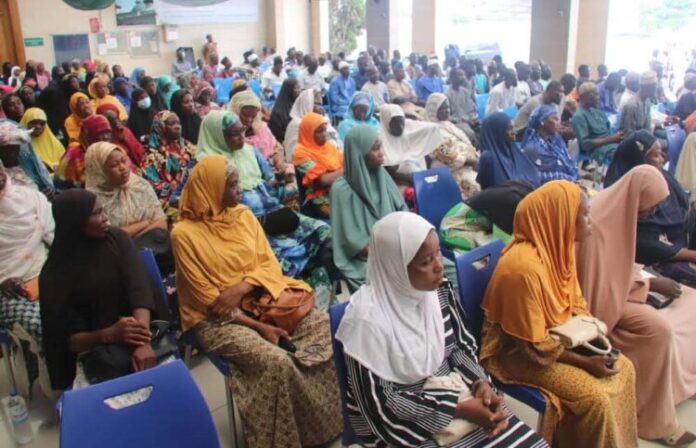“As the country faces ongoing economic challenges, initiatives like LEMU’s zakat disbursement same with Zakat and Sadaqah Foundation, reaffirm the importance of faith-driven community service, transparency, and the shared pursuit of socio-economic development through the institution of Zakat.”
The Pavilion of the Lekki Central Mosque was filled on Saturday, where the Lekki Muslim Ummah (LEMU) made a significant milestone in its commitment to fostering communal welfare through its 2025 Zakat Disbursement. Over 430 beneficiaries received a collective disbursement of N162 million in cash and material — an act rooted in Islamic obligation, philanthropy, and community development..
First, Alhaji Abdulganiy Labinjo, President of LEMU, articulated the profound spiritual and social imperatives behind this initiative. “Zakat in Islam is compulsory for every Muslim who has up to the threshold of zakat,” he explained. “This pool of funds is managed here to disburse appropriately, in line with the Sunnah. We screen applicants thoroughly, ensuring funds go to those who truly need them.”

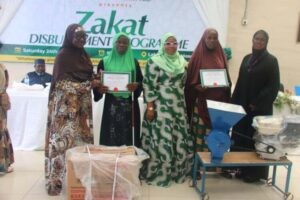
Labinjo highlighted the holistic approach of the organization, emphasizing not just financial aid but also capacity building and enlightenment on how to manage the zakat funds responsibly. “Money can be tempting, especially when large sums are involved, so we educate beneficiaries on prudent use,” he added.
Embracing Entrepreneurship and Self-Reliance
Addressing the gathering as a guest speaker, Dr. Jibril Salaudeen, Director of Executive Education at Nungu Business School, urged Nigerians to embrace entrepreneurial spirit. “Seventy percent of wealthy individuals globally are not in salary jobs. Opportunities abound in Nigeria, gaps that entrepreneurs can fill,” he said. His message was clear: self-reliance and innovation are pathways out of poverty.
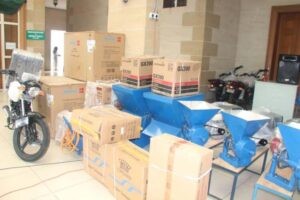
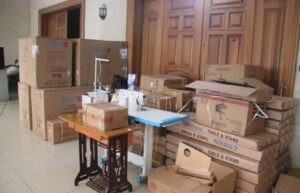
Ensuring Integrity and Sustainability
Alhaji Yunus Salisu, Chairman of the Zakat Committee, underscored the meticulous process of applicant screening, emphasizing transparency and accountability. “We monitor beneficiaries to ensure they use the funds appropriately,” he said. He also stressed the importance of aligning zakat with Islamic teachings, warning against misuse, such as spending zakat on Eid sacrifices instead of addressing genuine needs.
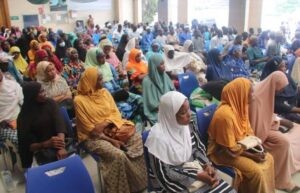
Challenging Poverty and the Role of Education
Dr. Ridwan Jamiu broadened the discussion on poverty alleviation, emphasizing the necessity of financial literacy and education. “Many we see on the streets are Muslims in debt, which is a spiritual and social problem,” he lamented. His plea: leverage zakat and government programs like NELFUND to combat poverty through education and responsible financial practices.

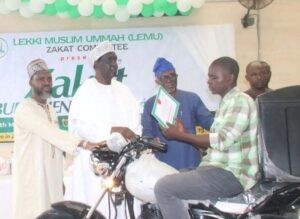
He further cautioned against shortcuts like patronizing interest-based loans and visiting soothsayers, highlighting that these ventures contradict Islamic principles and threaten spiritual peace.
The Impact of Zakat — A Bridge to Socioeconomic Stability
Dr. Jamiu also reflected on the societal benefits of zakat beyond immediate relief. “Zakat is the third pillar of Islam, enabling the rich to support the poor. Without it, societal issues like poverty and crime would be worse,” he stated.
He shared a poignant story from a beneficiary, Isah Ibrahim, illustrating the transformative power of zakat. Once a dispatch rider wrongfully imprisoned after theft of his bike, Ibrahim was rescued by LEMU, who intervened to secure his release and provided him with a new motorcycle. “I am grateful and pray Allah bless the ummah,” he said.
A Collective Hope for the Future
This year’s disbursement saw over 500 applications, with 430 beneficiaries receiving aid in sectors such as education, health, debt relief, and small business empowerment. The statement from LEMU’s leadership reflects optimism: “Our goal is to use zakat as a tool to bridge the gap between the haves and the have-nots, eventually turning beneficiaries into contributors,” said Labinjo.
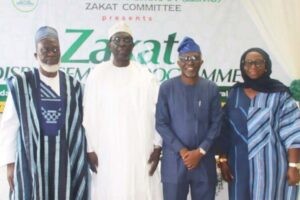
As the country faces ongoing economic challenges, initiatives like LEMU’s zakat disbursement same with Zakat and Sadaqah Foundation, reaffirm the importance of faith-driven community service, transparency, and the shared pursuit of socio-economic development through the institution of Zakat.

